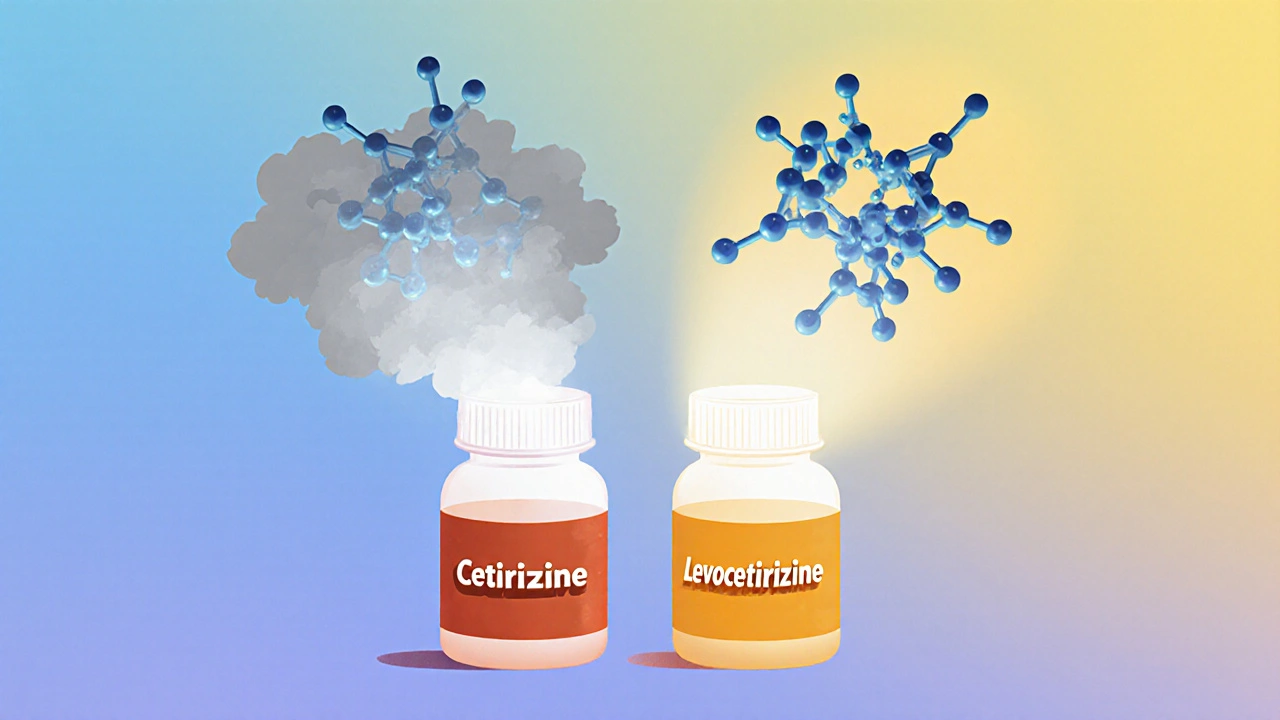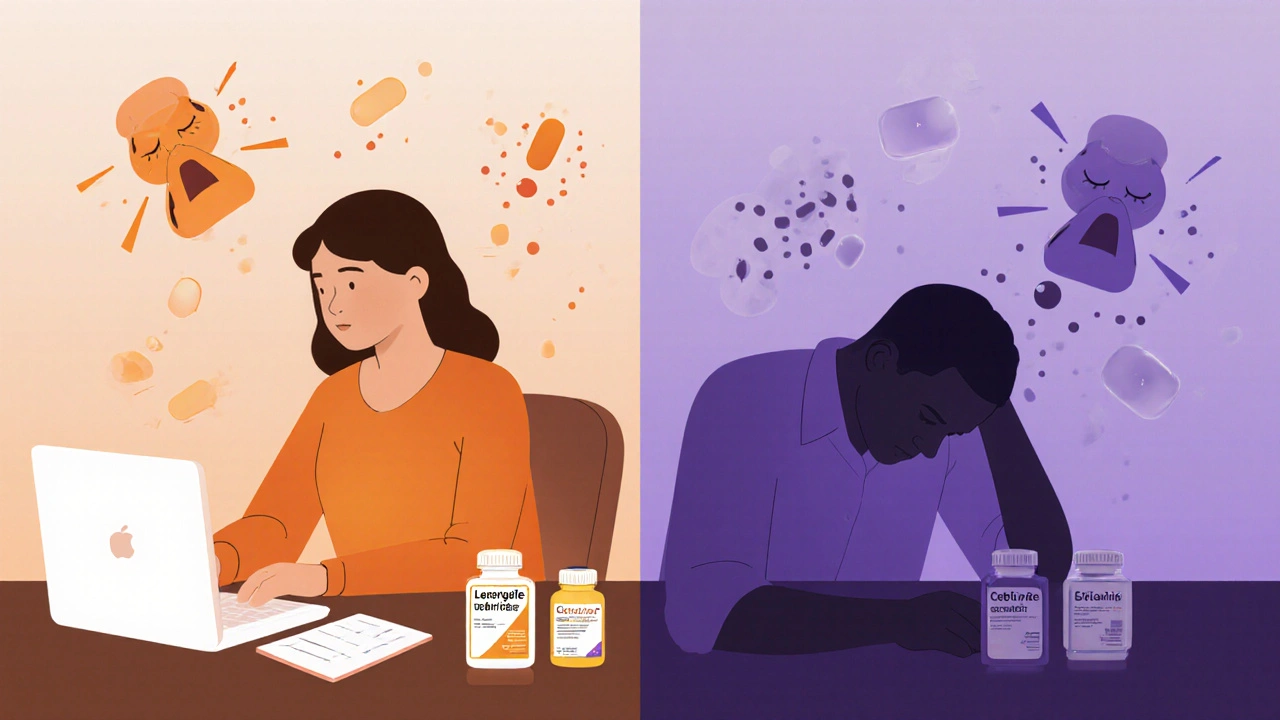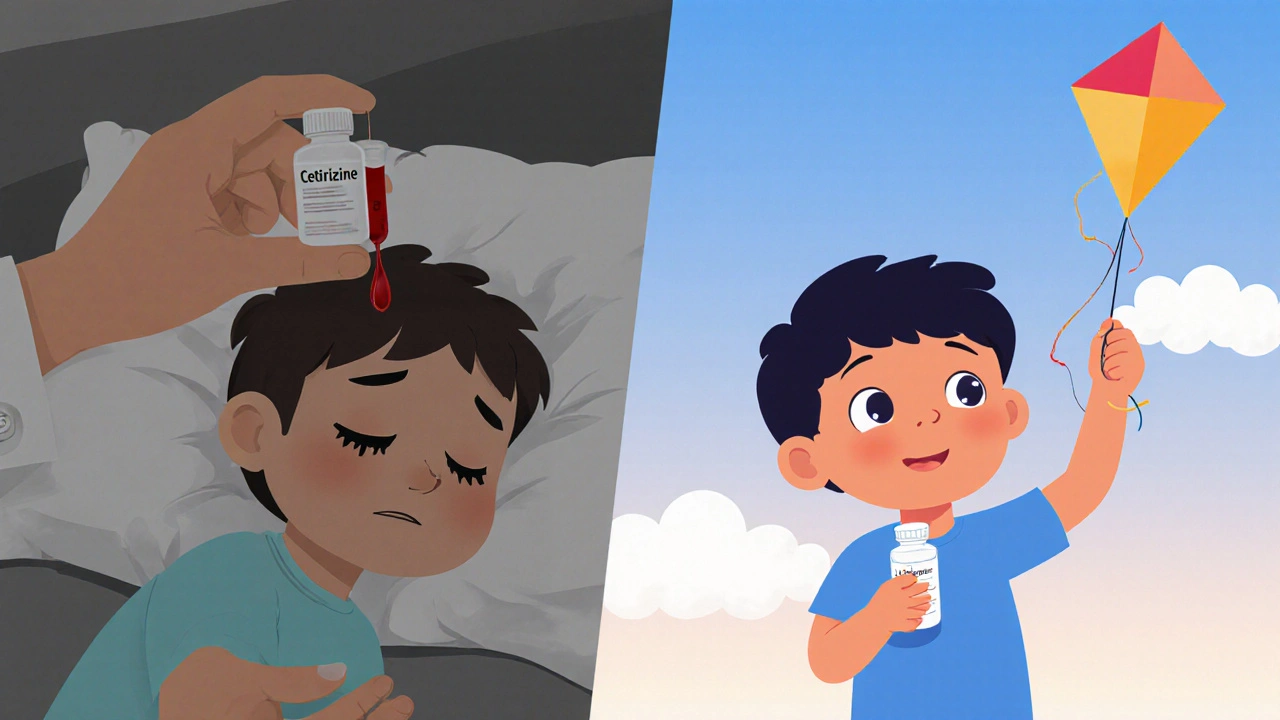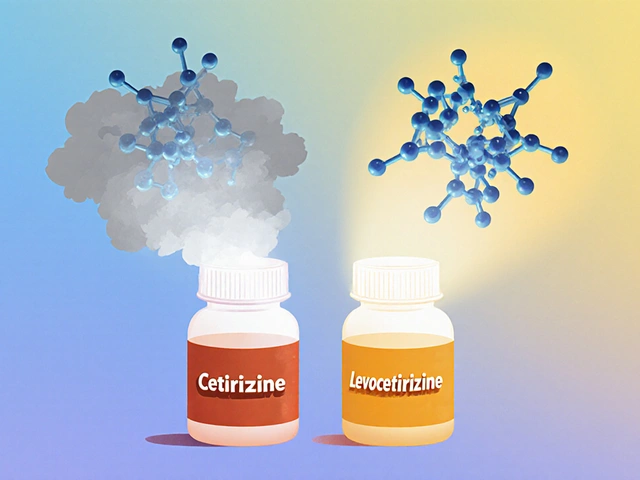Cetirizine vs Levocetirizine: Which Causes Less Drowsiness and Why

Allergy Medication Drowsiness Calculator
Cetirizine (Zyrtec)
Levocetirizine (Xyzal)
When you’re stuck with sneezing, itchy eyes, or a runny nose from allergies, you want relief-fast. But you don’t want to feel like you’ve been hit by a truck afterward. That’s where cetirizine and levocetirizine come in. Both are popular allergy pills you can buy over the counter. One is Zyrtec. The other is Xyzal. They look similar. They work similarly. But when it comes to drowsiness, there’s a real difference-and it matters more than you think.
What’s the Big Difference Between Them?
Cetirizine and levocetirizine aren’t just different brands-they’re chemically different. Think of cetirizine as a pair of gloves: one left, one right. Both gloves look alike, but only one fits your hand properly. Cetirizine is a mix of two mirror-image molecules: one active (levocetirizine) and one mostly inactive (dextrocetirizine). Levocetirizine is just the one glove that actually works. That’s why it’s called a third-generation antihistamine-it’s the purified version, stripped of the extra stuff.
This isn’t just chemistry class trivia. It’s why you can take 5 mg of cetirizine and get the same allergy relief as 2.5 mg of levocetirizine. The active part in both is identical. But the extra half in cetirizine? It doesn’t help with allergies. And it might be why you feel sleepy.
Which One Makes You Sleepier?
Here’s the simple answer: cetirizine causes drowsiness more often than levocetirizine.
Multiple studies back this up. One key trial with 18 healthy adults showed that levocetirizine at 2.5 mg blocked histamine just as well as cetirizine at 5 mg-but with less impact on brain activity linked to drowsiness. Another study in children with year-round allergies found both worked well, but cetirizine users reported more fatigue during the day.
Real people notice it too. On forums like Reddit and Drugs.com, users who switched from Zyrtec to Xyzal say the same thing: "I used to nap after lunch. Now I’m alert all day." One user wrote: "I work in an office. Zyrtec made me zone out during meetings. Xyzal? I didn’t even notice I was taking it."
That said, it’s not zero drowsiness with levocetirizine. About 6% of users still report feeling tired. But with cetirizine? That number jumps to 14%. And for people who are extra sensitive-like older adults or those taking other meds that affect the brain-the difference is even clearer.
Side Effects: Beyond Just Sleepiness
Both medications are generally safe. But side effects don’t stop at drowsiness. Here’s what else you might run into:
- Cetirizine: Dry mouth, headache, fatigue, sore throat, nausea. The drowsiness is the biggest complaint.
- Levocetirizine: Dry mouth, headache, tiredness-same list, but less frequent. Users report fewer cases of next-day grogginess.
Neither causes the same level of sedation as older antihistamines like diphenhydramine (Benadryl). But if you’ve ever woken up feeling like you didn’t sleep, even after taking an allergy pill at night, you’ve felt the quiet hangover of cetirizine. Levocetirizine doesn’t always avoid that-but it does reduce the odds.
One thing both share: they’re cleared by your kidneys. If you have kidney problems, your doctor might lower your dose. That’s true for both. Neither is linked to liver damage. Neither causes weight gain. Neither is addictive.

Effectiveness: Does One Work Better?
For most people, both do the same job. They stop sneezing. They calm hives. They reduce nasal itching. In clinical trials, they’re equally good at controlling symptoms of hay fever and chronic urticaria.
But here’s the twist: some people swear one works better for them. A 2022 survey of over 1,200 users found that 47% said cetirizine worked better for their symptoms. Another 38% said levocetirizine. The rest were neutral. That’s not a big gap. But it’s enough to suggest your body might respond differently to the inactive part of cetirizine-even if it doesn’t help with allergies, it might affect how your brain or gut reacts.
Doctors often say: try one for two weeks. If you’re still tired, switch. If your symptoms aren’t gone, try the other. It’s not about which is "stronger." It’s about which one your body tolerates.
Cost and Availability
Cetirizine is cheaper. A 30-day supply of 10 mg tablets costs about $13. Levocetirizine? Around $14.50. That’s not a huge difference-but if you’re paying out of pocket and you don’t have drowsiness issues, why spend more?
But if you’re a working parent, a truck driver, or someone who can’t afford to nod off during the day, that extra $1.50 might be worth it. Levocetirizine is also available in lower doses (2.5 mg), which is helpful for kids or people who need to start slow.
Both are sold without a prescription in the U.S. and the U.K. You’ll find them next to the cold medicine in any pharmacy. No special order needed.
Who Should Take Which?
Here’s a quick guide based on real-life needs:
- Choose cetirizine if: You’re on a budget, you take it at night, and you don’t feel drowsy the next day. It’s also the go-to for kids under 6-because it’s been used longer and has more pediatric dosing data.
- Choose levocetirizine if: You’re sensitive to drowsiness, you work during the day, you drive, or you’ve had bad reactions to other antihistamines. It’s also a smart pick if you’ve tried cetirizine and still feel foggy.
There’s no rule that says you have to pick one and stick with it. Many people rotate between them seasonally. Others keep both on hand-cetirizine for nights, levocetirizine for days.

What Experts Say
The American College of Allergy, Asthma, and Immunology says both are excellent choices. But they add this: "For patients who report drowsiness with cetirizine, switching to levocetirizine at half the dose often provides the same relief with less sleepiness."
Not every expert agrees that the difference is huge. Some say the sedation gap is small and mostly noticeable in people who are already prone to fatigue. But if you’re one of those people? That small gap matters a lot.
One doctor in Chicago put it this way: "I don’t push levocetirizine because it’s "better." I push it because it’s easier for people to live with."
What’s New in 2025?
There’s no major breakthrough yet, but the market is shifting. New combo pills with levocetirizine and montelukast (a nasal spray-type drug) are hitting shelves. These are for people with both allergies and asthma symptoms.
Pharmacogenomics-testing how your genes break down meds-is starting to show up in allergy clinics. In a few years, your doctor might run a quick saliva test to tell you whether you’re likely to feel drowsy on cetirizine. Until then, trial and error is still the best tool.
Bottom Line: Pick Based on Your Life, Not the Label
Levocetirizine isn’t a miracle drug. Cetirizine isn’t outdated. Both are safe, effective, and widely used. The real question isn’t which one is stronger. It’s: which one lets you live your day without feeling like you’re half-asleep?
If you’ve never tried either, start with cetirizine. It’s cheaper. If you’re fine after a week, stick with it. If you feel sluggish, switch to levocetirizine. You might not notice the difference in symptom control-but you’ll notice the difference in your energy.
And if you’re still unsure? Talk to your pharmacist. They’ve seen hundreds of people try both. They know which one works for the office worker, the new parent, the student cramming for exams. They won’t push a brand. They’ll help you find the one that fits your life.
Is levocetirizine stronger than cetirizine?
No, levocetirizine isn’t stronger-it’s more targeted. A 2.5 mg dose of levocetirizine works just as well as a 5 mg dose of cetirizine because it contains only the active part of the molecule. You get the same allergy relief with half the amount of chemical, which is why it’s less likely to cause drowsiness.
Can I take cetirizine and levocetirizine together?
No. They’re essentially the same drug. Taking both at the same time doesn’t make you feel better-it just doubles your dose of the same active ingredient. That raises your risk of side effects like dizziness, dry mouth, or even trouble urinating. Stick to one or the other.
Which one is safer for long-term use?
Both are safe for daily, long-term use. Studies have followed users for up to 12 months with no signs of organ damage or tolerance buildup. Levocetirizine may be slightly better for long-term use if you’re sensitive to drowsiness, since it’s less likely to affect your alertness over time.
Does either one cause weight gain?
Neither cetirizine nor levocetirizine is known to cause weight gain. That’s a myth often confused with older antihistamines like hydroxyzine. If you’ve gained weight while taking either, it’s more likely due to lifestyle changes, reduced activity from allergies, or another medication.
Can children take levocetirizine?
Yes. Levocetirizine is approved for children as young as 6 months old, usually in liquid form. The dose is based on weight: 1.25 mg for kids 6-23 months, 2.5 mg for 2-5 years, and 5 mg for 6 and older. Cetirizine is also safe for kids, and it’s more commonly prescribed because it’s been around longer and has more pediatric data.
What if I still feel drowsy on levocetirizine?
Try taking it at night instead of in the morning. Even levocetirizine can cause mild sleepiness in sensitive people. If that doesn’t help, consider switching to fexofenadine (Allegra), which has the lowest sedation risk of all second- and third-generation antihistamines. Or talk to your doctor about non-drowsy nasal sprays like fluticasone.
If you’re choosing between these two, don’t overthink it. Test one. If it works and you feel fine, keep it. If you’re dragging through your day, try the other. Your body will tell you which one it prefers.


Victoria Short
I switched to levocetirizine last spring and honestly? I didn’t even realize how tired I’d been until I wasn’t anymore.
Eric Gregorich
Let me tell you something about the chemistry here - it’s not just about the active enantiomer, it’s about the *ghost* of the inactive one haunting your GABA receptors. Cetirizine’s dextro form? It’s like that one roommate who never does laundry but still somehow smells like regret and antihistamines. Your brain doesn’t know it’s not supposed to react to it, so it just… shuts down. Levocetirizine is the clean version - no baggage, no emotional residue. It’s not just medicine, it’s a metaphysical upgrade. You’re not just treating allergies, you’re reclaiming your cognitive sovereignty. And let’s be real - if you’re still taking cetirizine because it’s cheaper, you’re paying for sleep in the form of missed deadlines, half-written emails, and staring blankly at your coffee like it owes you money.
Koltin Hammer
I’ve been taking both, depending on the season. Cetirizine at night when I’m just vegging after the kids are asleep - it helps me actually sleep, not just feel drowsy. But during the day? Levocetirizine. No question. I’m a high school teacher. If I nod off during a lecture on the French Revolution, I’m not just losing my job - I’m losing the respect of 15-year-olds who can smell weakness like sharks. One time I took cetirizine before a parent-teacher conference and I swear, a mom asked if I was ‘feeling okay.’ I said yes. She said, ‘You looked like you were about to fall into a coma.’ I switched the next day. Also, I tried the combo with montelukast this year. It’s like having a personal air filter in my sinuses. Wild times.
Phil Best
Oh wow. So you’re telling me the drug companies didn’t just rip us off by selling us the *dumb* version of the drug for 15 years? Shocking. Next you’ll tell me they sold us sugar pills labeled as ‘energy boosters’ and called it ‘vitamin B12.’ I mean, I get it - profit margins. But c’mon. Half the dose, same effect, less brain fog? That’s not science. That’s a public service. Someone’s got to call the FDA and say, ‘Hey, maybe stop letting Big Pharma peddle sleepy syrup as ‘allergy relief’ and start calling it what it is - a productivity tax.’
Parv Trivedi
Very informative article. I have been using cetirizine for my child’s seasonal allergies for three years now. He is six years old. I did not know about the difference between the two. I will speak to our pediatrician about switching to levocetirizine. Thank you for sharing this knowledge. In India, cetirizine is very common and affordable. But if levocetirizine helps with alertness, it is worth the small extra cost for children in school.
Willie Randle
Minor correction: the article states that levocetirizine is a third-generation antihistamine. Technically, both cetirizine and levocetirizine are second-generation; levocetirizine is the enantiopure form of cetirizine, not a structurally distinct generation. The distinction matters because calling it ‘third-gen’ implies a pharmacological innovation that doesn’t exist - it’s purification, not progression. That said, the clinical implications are valid: less drowsiness, same efficacy. Also, the pharmacokinetic profile is nearly identical, so renal clearance applies equally. Just saying - precision matters when people make decisions based on this info.
Connor Moizer
You people are overthinking this. If you’re tired on cetirizine, switch. Done. No PhD required. I’ve been driving trucks for 12 years. I used to nap at rest stops after Zyrtec. Now I take Xyzal. I don’t care if it’s ‘purified’ or ‘enantiomerically optimized’ - I care that I didn’t fall asleep at 70 mph last Tuesday. That’s the only science I need. And yeah, it’s $1.50 more. So what? I make more in one hour than I save in a month. Stop being cheap and start being alive.
kanishetti anusha
I’ve tried both, and honestly, I didn’t notice much difference until I started taking it with my morning tea. Turns out, caffeine masks the drowsiness - but only for a while. I switched to levocetirizine and now I don’t need to chug three cups to stay awake. Also, my 4-year-old niece takes it for eczema-related itching - no drowsiness at all. I think it’s more about how your body metabolizes it than the drug itself. Maybe we all need a little genetic test someday.
roy bradfield
This whole thing is a distraction. The real reason you feel drowsy is because the FDA allows Big Pharma to market these drugs with hidden neurotoxins to keep people docile. Why do you think they push ‘non-drowsy’ formulas? Because they know the truth - antihistamines are sedatives designed to keep you quiet while you work 12-hour shifts. Levocetirizine isn’t better - it’s just the version they released after the lawsuits. They didn’t fix the problem. They just gave it a new label and a higher price. And don’t get me started on the ‘saliva test’ they’re developing - that’s just step one to mandatory drug profiling. Wake up. They’re not helping you. They’re conditioning you.
Patrick Merk
Love this breakdown. I’m from Ireland and we’ve got the same OTC access here. I used to take cetirizine religiously until I started coaching soccer on weekends - then I’d be useless by halftime. Switched to levocetirizine and it’s like I got my brain back. Funny thing? My 70-year-old dad takes cetirizine and swears he’s fine. But he also naps after lunch and calls it ‘resting.’ I think he’s just in denial. My mum says I’m too dramatic. I say - if you’re not sleeping, you’re not resting. You’re just… existing. And that’s not living.